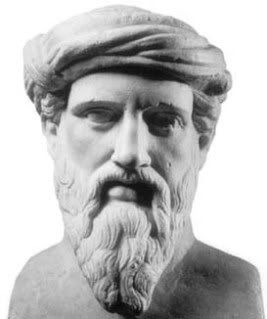 Contrary to the opinion of many people, philosophy is a very useful thing.
Contrary to the opinion of many people, philosophy is a very useful thing.
Why? Because it helps sharpen thought, teaching you how to see things in crystal clear categories instead of fuzzy muddied blurs.
Many people go through life experiencing life in a very dull way, they think they are in its flow but they are actually being carried along by its flow. Thinking and reflecting at least makes one see this flow for what it is.
A little bit of philosophy, now and then, is a useful thing: not taken as an end in itself but as a means of directing the mind to consider things we may not have even noticed before.
A bit ‘o space:
Take, for example, space. We experience space all around us, but asked to define it, can we? Leibnitz’s shallow (though still useful) definition of space as an order of co-existance gives us a starting point from which to consider the matter further. Ditto for time as “an order of succession.” While these definitions grasp at a simple logical examination of space and time, they are at least useful starting points to further consider the real nature of space and time as they manifest in the world we experience.
lim f()
So what of limits. What are limits? There is a mathematical concept of the limit, that’s important to understand.
Anyone who has taken Algebra and a bit of Calculus knows what a limit is in math. Basically a function has outputs that can be charted on a graph, if you take a certain number, at a certain point the output of that function will grow closer and closer to that number by infentesimal steps, or take a sequence of numbers a fraction of a whole number will grow nearer and nearer to the next number in the sequence, before it actually reaches it.
The rub is that limit’s in real life are similar to limits in math and philosophy. Picture a thin onion skin membrane between things, such that one thing does not bleed into another.
How close can two objects physically get, so that only a molecule’s breadth is between them, they are touching and yet not quite touching because there is still space between them.
Aristotle saw limits as either a FINAL cause of a thing; the form of a magnitude, or that magnitude itself; the ULTIMATE part of each thing, or the first part of it, outside of which no part can be found, or the first part of it INSIDE of which all things can be found (picture your skin, your skin is a limit in this sense); the end of each thing, toward which an action is directed – and sometimes both FROM which and TOWARD which a motion or action is directed.
Lastly, he saw a limit as a thing’s SUBSTANCE or essence – for this is the final limit of our knowledge of that thing.
Substance and grist:
The Spanish Sufi, Ibn Arabi, held a similar definition except he viewed a thing’s limits as its essence in a platonic sense, essentially. in other words, from a certain narrow perspective, YOU ARE YOUR LIMITS.
This isn’t a negative definition, though it is easy to only view it as such.
You can look at tis same statement (which is, again, a perspective – perspectives can be useful while not being absolute reality, they can have a relative truth that is useful in pointing you in a certain direction.
Philosophy is a means to an end, that end is knowledge. Philosophy orders the mind in a way allowing it to TRANSCEND that order and think more freely.
So often we think that we know something, but we actually don’t – we have a rough idea, but can’t articulate it – logic and philosophy forces you to articulate what you know.
Some people contend that this is a result of how we are educated, that education no longer teaches us how to think, but rather what to think, and this is the case in both secular and religious modes of education in our American culture.
Why do people drop out of school? Often because they don’t want to be told what to think, but if you empower someone by teaching her how to think, well, this enables her to understand reality around herself in greater depth throughout her life.
Happiness is knowledge, and “a warm gun”
🙂
Ignorance is only bliss to the ignorant. Who tend to be food for those with some knowledge, but few scrupples.